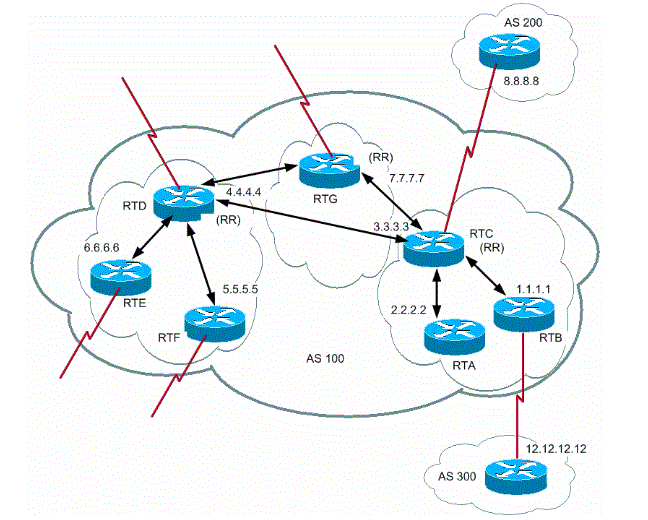- Cisco Community
- Technology and Support
- Networking
- Switching
- Route Reflector BGP
- Subscribe to RSS Feed
- Mark Topic as New
- Mark Topic as Read
- Float this Topic for Current User
- Bookmark
- Subscribe
- Mute
- Printer Friendly Page
- Mark as New
- Bookmark
- Subscribe
- Mute
- Subscribe to RSS Feed
- Permalink
- Report Inappropriate Content
01-03-2016 07:02 AM - edited 03-08-2019 03:16 AM
HI All,
Please advise on the below . I am sure I am confused.

From the DOC:
- Routes from a nonclient peer—Reflects to all the clients within the cluster.
Question: Say for RTC, non clients are RTG,RTD and 8.8.8.8. If RTC have learned a route via the AS 200(non-client), since it is EBGP relationship, it will also reflects to non clients e.g RTG and RTD is that correct?
2. Routes from a client peer—Reflects to all the non client peers and also to the client peers.
Question:Sat RTB, learned a new route via EBGP (AS 300), it will advertise to RTC. Since RTA is client, RTC will advertise to RTA.
why will RTC advertise to RTG and RTD ? They are only having iBGP relation and by default the router should not advertise is that correct?
3. Routes from an eBGP peer—Sends the update to all client and nonclient peers.
If I understand the above this will be clear I guess.
Solved! Go to Solution.
- Labels:
-
Other Switching
Accepted Solutions
- Mark as New
- Bookmark
- Subscribe
- Mute
- Subscribe to RSS Feed
- Permalink
- Report Inappropriate Content
01-03-2016 08:27 AM
Route reflectors are used to propagate IBGP routes and they are there to overcome the IBGP rule that if an IBGP speaking router learns a route from an IBGP peer it cannot then advertise that route to another IBGP peer.
So think of non clients as normal IBGP speaking routers and clients as being a special case.
The first example you give is misleading and could be causing the confusion because it is an EBGP route that RTC is learning so rule 3 from the above actually applies ie. the IBGP rule does not come into play on RTC.
So your questions -
1) it will be advertised to both clients and non clients because it is an EBGP route
2) if RTB is client of RTC then RTC will advertise it to all client and non client peers but if RTB is not a client of RTC it will only be advertised to client peers.
In effect if a route reflector receives a route from non client peer ie. normal IBGP router it is not allowed to advertise that route to another non client peer because this would break the IBGP route advertisement rule but it can advertise it to client peers because they are a special case.
Whereas if a route reflector receives an advertisement from a client peer then it can advertise it to a non client peer because this does not break the IBGP route advertisement rule.
Does that help ?
Jon
- Mark as New
- Bookmark
- Subscribe
- Mute
- Subscribe to RSS Feed
- Permalink
- Report Inappropriate Content
01-03-2016 08:27 AM
Route reflectors are used to propagate IBGP routes and they are there to overcome the IBGP rule that if an IBGP speaking router learns a route from an IBGP peer it cannot then advertise that route to another IBGP peer.
So think of non clients as normal IBGP speaking routers and clients as being a special case.
The first example you give is misleading and could be causing the confusion because it is an EBGP route that RTC is learning so rule 3 from the above actually applies ie. the IBGP rule does not come into play on RTC.
So your questions -
1) it will be advertised to both clients and non clients because it is an EBGP route
2) if RTB is client of RTC then RTC will advertise it to all client and non client peers but if RTB is not a client of RTC it will only be advertised to client peers.
In effect if a route reflector receives a route from non client peer ie. normal IBGP router it is not allowed to advertise that route to another non client peer because this would break the IBGP route advertisement rule but it can advertise it to client peers because they are a special case.
Whereas if a route reflector receives an advertisement from a client peer then it can advertise it to a non client peer because this does not break the IBGP route advertisement rule.
Does that help ?
Jon
- Mark as New
- Bookmark
- Subscribe
- Mute
- Subscribe to RSS Feed
- Permalink
- Report Inappropriate Content
03-29-2016 04:51 PM
Suppose, RT A and RT B have IBGP relation. RT B advertise routes received from AS 300 to RTA(non-client) and RT C. Will RT A send these routes received from RT B to RT C?
- Mark as New
- Bookmark
- Subscribe
- Mute
- Subscribe to RSS Feed
- Permalink
- Report Inappropriate Content
01-04-2016 04:46 AM
Hi Jon,
Many thanks for your reply.
Discover and save your favorite ideas. Come back to expert answers, step-by-step guides, recent topics, and more.
New here? Get started with these tips. How to use Community New member guide
